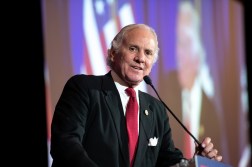Utah senator to propose teaching coding in schools

A Utah state senator plans to introduce legislation this January that will offer students in the state coding courses in what is becoming a growing trend across the country.
Sen. Howard Stephenson, a Republican from Draper, Utah, is proposing legislation that will make computer coding accessible to all students as early as elementary school in an effort to push them towards high-paying jobs in the technology sector.
“It gives them a sense of achievement and ability to want to become programmers,” Stephenson told the Desert News.
There are 14 states around the country that currently offering programming classes to students, typically offering it as an alternative to taking a foreign language, such as Spanish or French.
The case was made last week before Utah state legislatures as Stephenson and Amber Oliver, vice president at Globaloria, a company that sells curricula used to teach coding, made a presentation before the state’s Education Interim Committee.
Oliver said computer coding, by way of video game design, facilitates learning in science, technology, engineering and mathematics fields, which are where the job sector is showing some of the largest expansion.
“Utah’s tech industry is strong, robust and growing,” Oliver said, adding that more than 70 percent of the state’s tech employees are hired from other states because “local talent isn’t available.”
New Mexico was one of the states to introduce legislation last year that allowed for such an option. Students can learn JavaScript, HTML or other popular computer languages to fulfill foreign language requirements for graduation.
“Districts could still teach Latin, French or Spanish, but it provides the incentive for them to incorporate (computer) coding into their curriculum without it being an unfunded mandate,” state Sen. Jacob Candelaria told the Albuquerque Journal last year.
An influential player in the movement to bring computer science courses to schools is the nonprofit Code.org, which offers coding tutorials for people to use at home or in the classroom. The company aims to expand participation and education in computer sciences by making it available in more schools across the nation and to underrepresented students.
“Our main policy goal is to make computer science count as a math or science credit,” said Roxanne Emadi, grassroots strategist for Code.org. According to her, 33 out of 50 states don’t even allow computer science to count as anything but an elective course, but that number is quickly changing.






